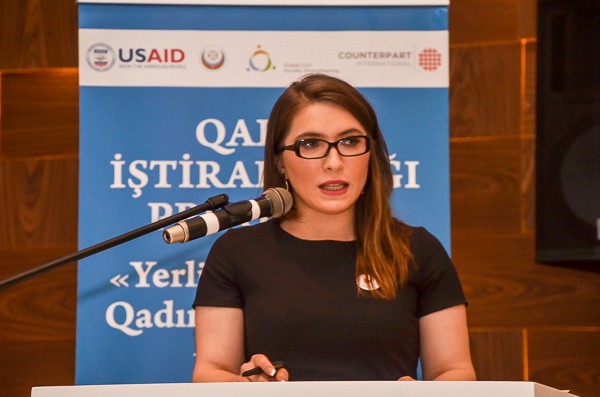
For Immediate Release
Despite the fact that various types of gender-based discriminations are still happening in Azerbaijan, each year more Azerbaijani women feel self-confident and ambitious for taking leading positions and running for political seats. According to the Central Election Commission’s official statistics, municipal elections, held in December 2014 in Azerbaijan, resulted in an eight percent increase in women’s representation across the country – from twenty-seven percent in 2009 to thirty-five percent in 2014.
These achievements became possible due to the combined efforts of Azerbaijani local civil society and state agencies with support from the Women’s Participation Program (WPP) funded by the United States Agency for International Development (USAID) and implemented by Counterpart International. Success is demonstrated by the 97 out of 401 women trained by WPP who assumed office in various regional municipalities.
In order to celebrate this progress, on June 5, 2015, Counterpart International, USAID, the State Committee for Family, Women and Children’s Affairs, and the Women for Development of Municipalities NGO, held the third Women’s Leadership Conference-“Strengthening Women’s Participation in Self-Governance: Activities and Future Perspectives.” The event, which took place in rural Gakh rayon of Azerbaijan, brought together a variety of women leaders, including recently-elected municipality members, representatives of key government, local and international organizations, along with senior regional government officials and civil society organizations. Together they discussed ways of strengthening women’s participation in local governance, municipal finance, and the role of municipalities in the regulation of gender-based violence and other related issues.
The first and second conferences, organized by the WPP in Baku and Shemkir in 2012 and 2013 respectively, as well as several other conferences on women’s leadership and empowerment, have resulted in the submission of 42 policy recommendations to the Government of Azerbaijan for review and consideration.
In his speech, Christopher Schaffer, Democracy and Governance Office Director from USAID/Azerbaijan, stressed that women's equal participation in local governments and decision-making processes is critical for strengthening democracy, creating gender sensitive policies and achieving sustainable development. He also thanked the government of Azerbaijan, Counterpart International, local civil society and international organizations for their efforts in empowering women and increasing women’s representation in local governance.
One of the conference’s top speakers, Musa Shekiliyev, Head of Gakh rayon Executive Power’s office, stressed Gakh women’s increased participation in decision-making processes and invited local women to engage other women in active participation in lives of their communities.
In her speech, Sadagat Gahramanova, Deputy Chairwoman of the State Committee for Family, Women and Children’s Affairs, eagerly emphasized that although at first women comprised only four percent of all elected individuals in municipal elections, this number increased to thirty-five percent at the last municipal elections held in 2014. Gahramanova said that she believed in the potential of Azerbaijani women and invited them to better demonstrate their power and follow their life goals.
Afterwards, the conference continued with discussions within three working group sessions: strengthening women’s participation in self-governance; existing and alternative sources of forming municipal budgets and the role of municipalities in the regulation of gender-based violence and various types of gender-based discrimination. As a result of the conference, all three working groups developed and presented a list of recommendations aimed at improving the situation regarding strengthening of women’s participation in local self-governance. These recommendations were forwarded to the relevant state agencies of Azerbaijan for further review and consideration.







Comment
Make a general inquiry or suggest an improvement.